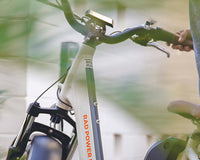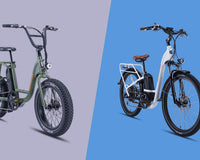We kicked-off our interview with Earl Blumenauer by wishing him a happy Bike Month. The Oregon Congressman fired back with a snappy retort: “Every month is bike month!”
You’d be hard pressed to find anyone on Capitol Hill more well-suited to make that claim. Since taking office over 25 years ago, he has developed a reputation as the most prominent cycling advocate in American politics.
Blumenauer began his Congressional career by bringing his bike to the nation’s capital instead of a car. He soon got to work building the Congressional Bike Caucus, a bipartisan collection of lawmakers who see the value in developing cycling infrastructure. When asked to name his top achievement, he’ll usually call out getting bike lanes installed along Washington, D.C.’s Pennsylvania Avenue, the street where the White House is located.

When he’s not commuting to the Capitol on his bike or doling out neon bicycle pins to likeminded allies, Blumenauer is crafting legislation aimed at making the U.S. a little more accommodating for those of us who prefer a life on two wheels. His latest goal? The Electric Bicycle Incentive Kickstart for the Environment Act, or as it's better known, the E-BIKE Act.
Under the proposal, which was co-authored by California Congressman Jimmy Panetta, the Federal government would provide a tax credit of 30 percent off (up to $1,500) a new electric bike priced at under $8,000.
“Giving a modest tax credit, not unlike what we’ve done with electric cars, seemed like a reasonable way to promote cycling,” Blumenauer told the Scenic Route. “We’re finding people are interested, they’re intrigued. I think it would really make a difference.”
Like many old-school cyclists, Blumenauer was a little dismissive of electric bikes — at least at first.
“It just seemed like it was cheating,” he explained.
His tune changed, however, when he gave one a try.
“A few years ago, I was visiting a friend in Vancouver, B.C., exploring their bike infrastructure when my wife and I decided on a lark to rent ebikes and go around Stanley Park,” he recalled. “It was really fascinating. Intellectually, you know you don’t have to use the power, but it was good to know how easily you can shift between actually pedaling and getting that little boost when you want it, particularly going up some challenging terrain. We really had a delightful time.”
Looking for your own test ride? Find a Rad Power Bikes rental location near you!
The experience prompted him to take a closer look at ebikes, not just as fun way to explore a new city, but as a legitimate tool for social change.
“It seems clear that ebikes are one of the most effective ways to shift people out of cars and promote cycling culture.”
“It’s important to have that mindset so more people take advantage of cycling,” he added. “There’s safety in numbers. The more people you have on two wheels, the more comfortable they feel, and it adds to the momentum.”
The legislation comes at a time when lawmakers are mulling a $2.3 trillion infrastructure plan put forth by the Biden administration.
As Blumenauer tells it, the E-BIKE Act would be a natural fit for this legislative approach.
 "My objective is to have people look at this in a broader context. I was talking to the Secretary of Transportation yesterday about the opportunities we have with this big infrastructure package and this is one of those elements that ties in with what we're doing with the tax system," Blumenauer said. "It reduces traffic congestion, there’s less pollution to contend with, and it eases the problem of parking. Frankly, it’s a healthier option physically because people are, in fact, pedaling at varying degrees of intensity. It beats the heck out of sitting in a couple of tons of metal and plastic."
"My objective is to have people look at this in a broader context. I was talking to the Secretary of Transportation yesterday about the opportunities we have with this big infrastructure package and this is one of those elements that ties in with what we're doing with the tax system," Blumenauer said. "It reduces traffic congestion, there’s less pollution to contend with, and it eases the problem of parking. Frankly, it’s a healthier option physically because people are, in fact, pedaling at varying degrees of intensity. It beats the heck out of sitting in a couple of tons of metal and plastic."
Another major benefit: job growth.
“Infrastructure for cycling actually creates more jobs per million dollars that we invest in it than if we just paved more roadways, plus it’s not as disruptive to neighborhoods or the environment,” he said.
“But also, when it comes to the economy, you know that if you’re riding an ebike, you're much more likely to stop and look at a roadside attraction. People who ride bikes and ebikes are actually buying more than people who are just driving through neighborhoods. They're better customers.”
While it’s uncertain when, if at all, the act will find itself signed into law, Blumenauer expressed optimism about a number of key factors.
One is the unprecedented demand for alternative forms of transportation in the wake of the COVID-19 pandemic. Another is an aging cycling population that would immediately benefit from having easier access to ebikes. The fact that Blumenauer also serves on the powerful House Ways and Means Committee, which controls the Federal purse strings and sets tax policy, almost certainly helps.
A less obvious element Blumenauer pointed to is just how many cyclists are currently situated in senior leadership roles.
“The President and First Lady ride bikes and Secretary of Transportation Pete Buttigieg often uses bike share,” he said. "[Climate envoy] John Kerry is a dedicated cyclist, a serious cyclist. I spent some time cycling with him back when he was running for President.”
“Having people in positions of power who bike recreationally is important since they understand the benefits of having good cycling infrastructure,” he noted. “They know that something like having more bike lanes is low cost and high impact.”
Surprisingly, the fact that Congress is engulfed with partisan infighting does little to dim the lawmaker’s hopes.
“In the Bike Caucus, we aren’t just bipartisan, we are officially bike-partisan," Blumenauer quipped.
It makes sense. After all, It’s hard to stay angry when you’re on a bike, especially when you’re sharing it with a big, friendly community. Bringing people together might even be another reason why the country could use some legislation to get more folks in the saddle and out discovering the joys of cycling -- something like the E-BIKE Act.

If you want to see a consumer tax credit for new ebikes, contact your Congressional representative and politely ask them to lend their support.
And keep an eye on this issue. There’s a long road ahead, including making it to the Senate!






